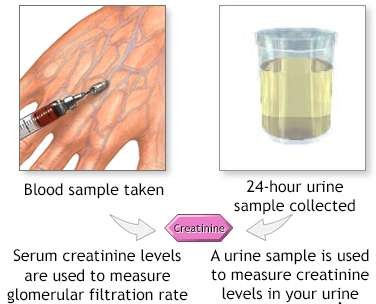A nurse is caring for a client who will have blood sampling for serum creatinine level and asks what this test shows. Which of the following responses should the nurse make?
"This test will tell your doctor how your kidneys are functioning."
"This test will tell if you have severe renal impairment or a disease."
"We'll find out if any medications, such as steroids, are interfering with your kidney function."
"You'll have to ask your doctor."
The Correct Answer is A
Choice A reason: The serum creatinine test measures the amount of creatinine in the blood and provides information about kidney function. Normal ranges for serum creatinine levels are 0.74 to 1.35 mg/dL for adult men and 0.59 to
1.04 mg/dL for adult women. This test is a common way to assess renal function and can indicate if the kidneys are not filtering waste effectively.
Choice B reason: While a serum creatinine test can indicate severe renal impairment, it does not diagnose a specific disease. Further testing would be required to determine the presence of a particular renal disease.
Choice C reason: The serum creatinine test does not directly show if medications are affecting kidney function. However, if a patient is on medications known to affect the kidneys, such as certain steroids, changes in creatinine levels can suggest an impact on renal function.
Choice D reason: It is part of the nurse's role to provide information about tests and procedures. Telling a patient to ask the doctor does not offer immediate support or information, which can be important for patient care and understanding.

Nursing Test Bank
Naxlex Comprehensive Predictor Exams
Related Questions
Correct Answer is ["A","C","D"]
Explanation
Choice A reason: Ensuring the client's urine output is at least 1 mL/kg/hour is important before administering potassium to prevent hyperkalemia, especially in clients with renal impairment.
Choice B reason: While educating the client about high-potassium food sources is important, it is not directly related to the administration of intravenous potassium.
Choice C reason: Cardiac monitoring during infusion is crucial due to the risk of arrhythmias associated with rapid
changes in potassium levels.
Choice D reason: Repeating blood serum potassium is necessary to monitor the effectiveness of the supplementation and avoid hyperkalemia.
Choice E reason: Potassium should not be prepared with 5% dextrose solution as it may cause a trans-cellular shift of potassium into cells, which is not recommended.
Correct Answer is A
Explanation
Choice A reason: Epoetin alfa is used to treat anemia associated with chronic kidney disease, and iron supplementation is often required to support red blood cell production.
Choice B reason: Sodium intake does not need to be increased with epoetin alfa therapy and should be monitored carefully in clients with chronic kidney disease.
Choice C reason: Potassium levels should be monitored in chronic kidney disease and not necessarily increased, as hyperkalemia can be a concern.
Choice D reason: Protein intake should be managed carefully in chronic kidney disease to avoid excess nitrogen waste, which can be difficult for damaged kidneys to filter.
Whether you are a student looking to ace your exams or a practicing nurse seeking to enhance your expertise , our nursing education contents will empower you with the confidence and competence to make a difference in the lives of patients and become a respected leader in the healthcare field.
Visit Naxlex, invest in your future and unlock endless possibilities with our unparalleled nursing education contents today
Report Wrong Answer on the Current Question
Do you disagree with the answer? If yes, what is your expected answer? Explain.
Kindly be descriptive with the issue you are facing.
